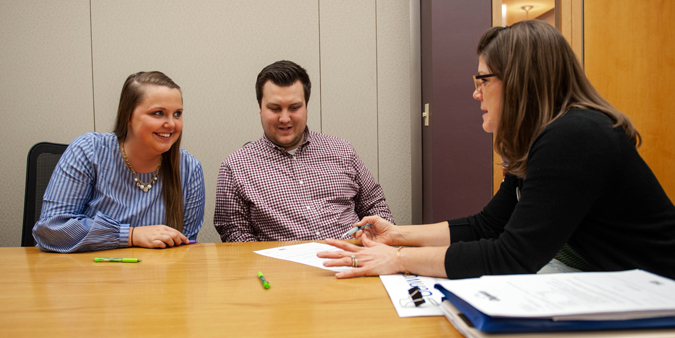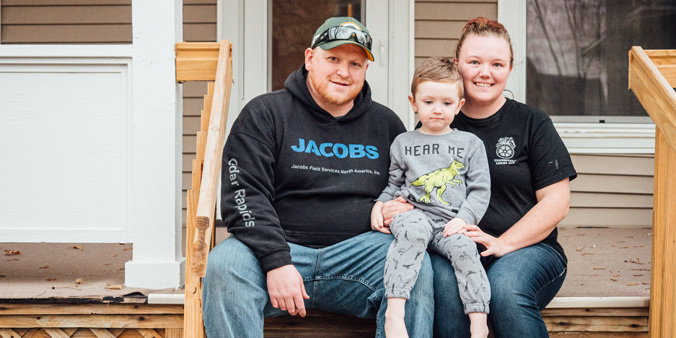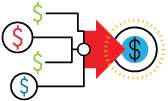 Dupaco members Tom and Rebecca Ameche close on their first home with Dupaco’s Krystal Frederick (right) last April at the Dupaco branch in Asbury, Iowa. With the help of their credit union, the couple purchased their Dubuque, Iowa, home a few months before their wedding day. (M. Blondin/Dupaco photo)
Dupaco members Tom and Rebecca Ameche close on their first home with Dupaco’s Krystal Frederick (right) last April at the Dupaco branch in Asbury, Iowa. With the help of their credit union, the couple purchased their Dubuque, Iowa, home a few months before their wedding day. (M. Blondin/Dupaco photo)
How to decide whether you can afford to buy a bigger house
Updated on Jan. 24, 2025, at 3:10 p.m. CT
By Krystal Frederick | Assistant vice president, mortgage lending
Life changes, and so do our housing needs. Maybe your household is growing, your income has increased or you’re ready to upgrade your starter home for something with more space.
Whatever your reason for dreaming of a bigger house, the good news is that you’ve been through this process before, so you’re more familiar with how the homebuying journey works.
Still, buying a larger home is a big decision. And it’s worth taking the time to think through the details carefully. A larger home often comes with more expenses. And you want to feel confident that you can comfortably afford to buy a bigger house.
Here’s a breakdown of what to consider—in addition to the mortgage and interest—when looking at a larger home:
Compare property taxes
If your next house is in a different area, property taxes might be higher, which will affect your budget.
Ask your real estate agent about property taxes in your desired neighborhood. Another option: Check your county assessor’s website to look up past property taxes for that address.
Knowing what to expect helps ensure there aren’t surprises when your tax bill arrives.

Calculate the utilities of a bigger house
A bigger home means more rooms to heat in the winter and cool in the summer.
If you’re serious about a particular property, ask your real estate agent to find out what the seller’s average utility bills are during each season.
Another factor to consider: Costs associated with city services, like water and refuse collection, vary from one community to the next. If you’re thinking about moving to another city, find out what that community’s fee structure is.
Review potential changes to your insurance
The size, age and location of your new home could influence your homeowner’s insurance premiums. Your credit score and claims history may also play a role.
It’s worth taking the time to talk to your insurance agent. You’ll want to understand how the cost of insuring a larger home might compare to your current premiums.
Know how much it costs to sell your current home
Selling your current house typically comes with its own expenses, including:
Talk to your mortgage lender or real estate agent to find out what charges you will incur. This can help you plan and budget accordingly.
Do you know the best time to sell a house? >
Review your budget
If you’re feeling uncertain about handling a larger monthly payment, it’s worth reviewing your finances.
Consider scheduling a free Dupaco Money Makeover to explore ways to potentially restructure your debt and free up more room in your budget.
Options might include:
Schedule a free Money Makeover >
Practice making bigger payments
Before committing to a larger mortgage, try living as though you already have it.
Here’s what that looks like:
- Say you’re currently paying $1,000 a month for your mortgage, and you’re considering a home that would increase your monthly payment to $1,500. Open a Dupaco You-Name-It Savings account, and have that extra $500 automatically transferred into that account each month. Try that for three months.
This gives you a clearer picture of whether you can comfortably manage the increased costs without making the leap right away!
Get pre-approved for your loan
If you plan to buy a bigger house soon, getting pre-approved for your mortgage is a smart next step.
This will help you understand how much you can borrow based on your income and existing debt. It also shows sellers that you’re a serious buyer.
Ask about programs and products
While many homebuyer grants are designed for first-time homebuyers, there might still be programs or products that fit your situation. Options like 100% financing might be available.
Talk to your mortgage lender to find out what options would work best for you.


